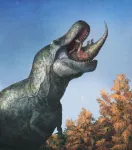(Press-News.org) The European Research Council (ERC) announced that Professor Jonathan Chase will be awarded one of the prestigious ERC Advanced Grants. The scientist will receive almost 2.5 million euros over the next five years to fund his research project "MetaChange". With this project, he plans to develop new concepts, tools and analyses for a better understanding of biodiversity and its change. Chase has been conducting research and teaching at Martin Luther University Halle-Wittenberg (MLU) and the German Centre for Integrative Biodiversity Research (iDiv) Halle-Jena-Leipzig since 2014.
"Jonathan Chase is one of the most distinguished researchers at the University of Halle. He is the author of acclaimed studies and his work makes a significant contribution to making biodiversity research from central Germany known worldwide. We are proud that his scientific work has now been awarded an Advanced Grant from the European Research Council. This is a great signal for MLU and iDiv," says MLU Rector Prof. Dr. Claudia Becker.
Prof. Dr. Henrique Pereira, iDiv speaker and professor at MLU, adds: "Jon Chase’s work at iDiv has had a far-ranging impact on biodiversity research. He has led several global synthesis analysis and has shown how the scale of analysis affects different metrics of biodiversity change. The ERC Advanced Grant recognises his extraordinary achievements and provides support for the continuation of his work."
"I thank the ERC for the great trust placed in me with the Advanced Grant. I will use the funding to close important knowledge gaps in how biodiversity is changing through time," says Prof. Dr. Jonathan Chase. His new research project will use a common problem of biodiversity research as a starting point: even though extensive data on local and global biodiversity exists, these are often not comparable with each other. "Studies often disagree on the question of what is actually meant by biodiversity and what it means that it is changing. The differences are magnified because studies are so different when it comes to the species studied, the methods used and the analytical procedures," says Chase. This makes it difficult to make concrete statements about how and where biodiversity is changing, and importantly, to identify the reasons for these changes. "There is no question that biodiversity is changing in many ways around the world, and that these changes are ongoing because of the actions of people. However, we lack a clear and consistent way to quantify exactly what these changes are and how to attribute potential causes of these changes," Chase continues. This knowledge, however, is required for accurate and effective conservation measures, which have also been mandated by the recent international agreements at the UN.
One of Chase's fields of expertise is the synthesis of large data sets on the distribution and abundance of species from across the world with the help of computer-assisted methods. With this synthesis, new insights are gained. With the help of the ERC funding, Chase now wants to take this work to a new level: "One of the biggest challenges we have in biodiversity science is that we are getting much better at understanding what has happened to biodiversity in the past, and we’re starting to provide some answers as to the potential causes of those changes. However, we are particularly bad at forecasting biodiversity change into the future. There are many ways to try this, although which ones work best is anyone’s guess." By compiling biodiversity change through time from many thousands of sites across the planet, and combining it with new statistical tools, the researcher hopes to provide better forecasts for how biodiversity might change in the future.
Jonathan Chase was born in the USA. After studying at the University of Michigan and Utah State University, he completed his doctorate at the University of Chicago in 1998. After several years of teaching and doing research at various US universities, Chase was appointed Professor of Biodiversity Synthesis at MLU and iDiv in Germany in 2014. He is the author of more than 138 scientific articles published in renowned journals such as "Nature", "Science" and "PNAS", as well as two foundational books. "Clarivate Analytics" included Chase in the list of "highly cited researchers 2022", representing the most frequently cited researchers worldwide.
The ERC Advanced Grants are among the most prestigious and coveted research awards in Europe. The European Research Council awards them to world-leading scientists who applied for funding of their highly ambitious and promising research projects. A total of almost 1,650 project proposals was submitted in this round of ERC Advanced Grants, from which 218 were selected for funding across Europe. The funding rate is thus 13.2 percent.
END
New ideas for biodiversity research: ecologist Jonathan Chase receives ERC Advanced Grant
2023-03-30
ELSE PRESS RELEASES FROM THIS DATE:
Breaking the barrier: Low-temp ammonia synthesis with iron catalysts and barium hydride
2023-03-30
The Haber-Bosch (HB) process is one of the most important industrial chemical reactions. It combines nitrogen and hydrogen gases in the presence of an iron-based catalyst at high temperatures and pressures to produce ammonia fertilizer which helps provide food for over five billion people. Over the decades, researchers have tried to bring down the reaction temperature of the HB process to increase the ammonia yield while reducing energy consumption. To this end, they have recently developed new catalysts based on other transition metals, ...
Boosting the body’s anti-viral immune response may eliminate aging cells
2023-03-30
BOSTON – Aging, or senescent cells, which stop dividing but don’t die, can accumulate in the body over the years and fuel chronic inflammation that contributes to conditions such as cancer and degenerative disorders.
In mice, eliminating senescent cells from aging tissues can restore tissue balance and lead to an increased healthy lifespan. Now a team led by investigators at Massachusetts General Hospital (MGH), a founding member of Mass General Brigham (MGB), has found that the immune response to a virus that is ubiquitously present in human tissues ...
Revealing the pattern between frontal polymerization and natural convection
2023-03-30
A self-propagating chemical reaction can transform a liquid monomer into a solid polymer and the interaction between the propagating front and the reaction’s natural convection leads to patterns in the resulting solid polymeric material. New University of Illinois Urbana-Champaign work has shown how the coupling between natural convection and frontal polymerization leads to those observed patterns.
This research was led by a unique team of researchers- Materials Science and Engineering professor Nancy Sottos, Aerospace Engineering professor Philippe Geubelle, and Mechanical Science and Engineering ...
New mechanisms and therapeutic possibilities for heart failure uncovered by scientists at the Lewis Katz School of Medicine at Temple University and Johns Hopkins University
2023-03-30
(Philadelphia, PA) – Greater awareness and advances in treatment have greatly improved survival rates following heart attack. With more survivors, however, has come the challenge of managing long-term impacts on heart function, especially chronic heart failure, in which the heart gradually loses its ability to pump blood.
Mortality among individuals affected by chronic heart failure following a heart attack – referred to medically as myocardial infarction (MI) – is high. But, according to new research from a major collaborative effort led by scientists at the Lewis Katz School of Medicine at Temple University, more effective treatments may soon ...
How to achieve a functional cure for chronic hepatitis B
2023-03-30
Geneva, March 30, 2023 – More than half of patients who suffer from chronic hepatitis B have the e antigen (HBeAg)-negative form of the disease. Even after many years of antiviral treatment with nucleos(t)ide analogues (NUC), lasting immune control is almost never seen. According to the current state of knowledge, those affected therefore require lifelong therapy. In the world’s first randomized controlled multicenter study – led by Leipzig University’s Faculty of Medicine and in partnership with the Centre for Clinical Studies (ZKS) – researchers have shown that many HBeAg-negative patients ...
New, exhaustive study probes hidden history of horses in the American West
2023-03-30
A team of international researchers has dug into archaeological records, DNA evidence and Indigenous oral traditions to paint what might be the most exhaustive history of early horses in North America to date. The group’s findings show that these beasts of burden may have spread throughout the American West much faster and earlier than many European accounts have suggested.
The researchers, including several scientists from the University of Colorado Boulder, published their findings today in the journal Science.
To tell the stories of horses in the West, the team closely examined about two dozen sets of ...
Newly discovered trigger for major depression opens new possibilities for treatments
2023-03-30
A common amino acid, glycine, can deliver a “slow-down” signal to the brain, likely contributing to major depression, anxiety and other mood disorders in some people, scientists at the Wertheim UF Scripps Institute for Biomedical Innovation & Technology have found.
The discovery, outlined Thursday in the journal Science, improves understanding of the biological causes of major depression and could accelerate efforts to develop new, faster-acting medications for such hard-to-treat mood disorders, said neuroscientist Kirill Martemyanov, Ph.D., corresponding author of ...
Search for a major depression trigger reveals a familiar face: Discovery opens new possibilities for treatments
2023-03-30
JUPITER, Fla.— A common amino acid, glycine, can deliver a “slow-down” signal to the brain, likely influencing major depression, anxiety and other mood disorders in some people, scientists at The Herbert Wertheim UF Scripps Institute for Biomedical Innovation & Technology report online in the journal Science today.
The discovery improves understanding of the biological causes of major depression and could accelerate efforts to develop new, faster-acting medications for such hard-to-treat mood disorders, said neuroscientist Kirill Martemyanov, Ph.D., corresponding author of the study, appearing in Friday’s ...
AI predicts enzyme function better than leading tools
2023-03-30
CHAMPAIGN, Ill. — A new artificial intelligence tool can predict the functions of enzymes based on their amino acid sequences, even when the enzymes are unstudied or poorly understood. The researchers said the AI tool, dubbed CLEAN, outperforms the leading state-of-the-art tools in accuracy, reliability and sensitivity. Better understanding of enzymes and their functions would be a boon for research in genomics, chemistry, industrial materials, medicine, pharmaceuticals and more.
“Just like ChatGPT uses data from written language to create predictive text, we are leveraging ...
Predatory dinosaurs such as T. rex sported lizard-like lips
2023-03-30
A new study suggests that predatory dinosaurs, such as Tyrannosaurus rex, did not have permanently exposed teeth as depicted in films such as Jurassic Park, but instead had scaly, lizard-like lips covering and sealing their mouths.
Researchers and artists have debated whether theropod dinosaurs, the group of two-legged dinosaurs that includes carnivores and top predators like T. rex and Velociraptor, as well as birds, had lipless mouths where perpetually visible upper teeth hung over their lower jaws, similar to the mouth of a crocodile.
However, an international team of researchers challenge some of the best-known depictions, and say these dinosaurs had lips similar to those ...







